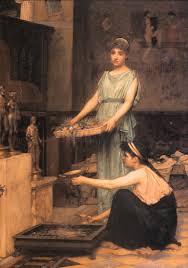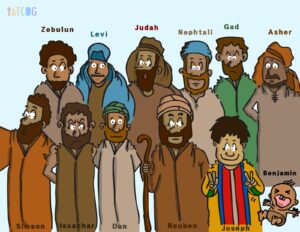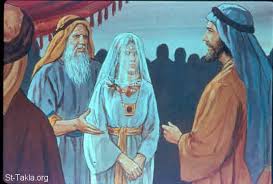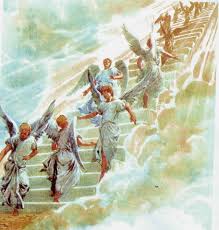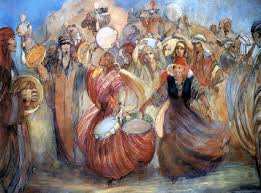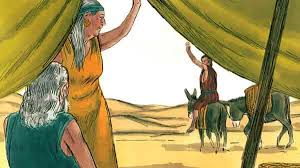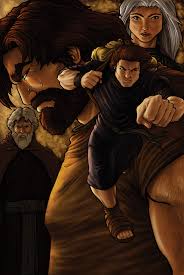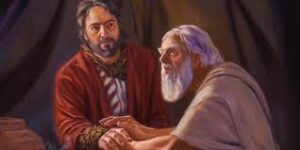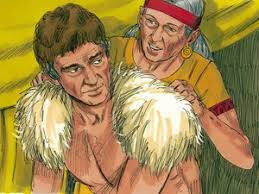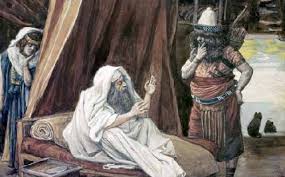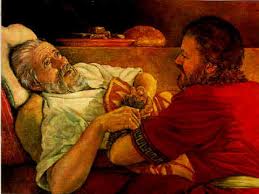Hl – Leah Became Pregnant and Bore Issachar, Zebulun and Dinah 30: 14-21
God Listened to Leah, and She Became Pregnant
and Bore Issachar, Zebulun and Dinah
30: 14-21
God listened to Leah, and she became pregnant and bore Issachar, Zebulun and Dinah DIG: What are mandrakes? What deal did Rachel make with Leah? What was the motivation for each wife? What did Jacob think? Why did Rachel probably end up being mad? What did the names of Leah’s son’s mean? Why was Dinah mentioned?
REFLECT: How does it feel to work and work to try to impress someone and they don’t give you the time of day? Are you doing that now? Where can you put your energies to better use?

Years later during the wheat harvest, Reuben, who was about seven years old at the time, went out into the fields and found some mandrake plants, literally meaning love apples, which he brought to his mother Leah. Mandrakes are in the potato family. They grow in stony ground in Palestine and are very common. Their berries have white and reddish blossoms, and a yellow fruit similar to small apples that ripen in March and April. They emit a very distinctive odor. Mentioned in Song of Songs 7:13, the superstition was that they were an aphrodisiac, or an inducer of fertility. The Hebrew root of mandrake is the same as the Hebrew word for lover. Rachel was so desperate that she seemed to think they would solve her problem of barrenness. So when she saw the mandrakes, she said to Leah her sister: Please give me some of your son’s mandrakes (30:14).
But Leah said to her, “Wasn’t it enough that you took away my husband? Will you take my son’s mandrakes too?” She had no intention of improving her sister’s love life, in light of the fact that she was already his favorite. But Rachel made Leah an offer she couldn’t refuse and said: Very well, he can sleep with you tonight in return for your son’s mandrakes (30:15). She obviously hoped that later, when she would be with Jacob, the mandrakes would enable her to become pregnant. These were desperate housewives.
So when Jacob came in from the fields that evening, he found that he had been hired by Leah to sleep with her that night. Leah went out to meet him. You must sleep with me tonight, she said in a very businesslike manner: I have hired you with my son’s mandrakes. He didn’t say a word. Was he amused or flattered by this competition between his two wives? Was he saddened with the strife and competition? How did he feel about having children with the maidservants of his wives? Was he just trying to keep peace in the family? We don’t know, but he seems compliant. So he slept with her that night (30:16). The Hebrew word for hired is saphar, which is the root meaning of her next son’s name. The use of the word hired indicates that Ya’akov normally slept with Rachel, whom he really loved.
As a result, God listened to Leah, and she became pregnant and bore Jacob a fifth son (30:17). I am sure this infuriated Rachel to no end. Rachel got the mandrakes, but it was Leah who had another baby! Then Leah said that God has given me my hire, sechari, because I have given my maid to my husband (30:18a NKJ). Leah had hired Jacob with the mandrakes; now Leah thinks that Elohim has rewarded her for giving Zilpah to Jacob (30:9-13). The reward was a fifth son. So she named him Issachar, which means hire (30:18b). Jacob could not walk through a bedroom without finding a baby there.
Leah conceived again and bore Jacob (Hebrew: Ya’akov) a sixth son (30:19). Leah had four sons originally, two sons by her maidservant, and now two more sons. Then Leah said: God has given me a wonderful gift (30:20a). In Hebrew the word endowed me is cevadni, and the word dowry is zeved. Now my husband will dwell with me; in Hebrew it is yizbeleini, from the Hebrew zabal, which means to dwell or to honor, because I have borne him six sons. It was a word used for the marriage gift, so she named him Zebulun, which means dwelling or honor (30:20b).
So after bearing six sons, she gave birth to a daughter and named her Dinah (30:21). Therefore, the seven additional years Jacob agrees to serve Laban for Rachel parallel the seven children he fathers by Leah. In other words, Leah bears one child for each of the seven years that Ya’akov served for Rachel (30:25-36).482
After the first seven years, Leah will have several more daughters. We know this because when Joseph seemed lost to him, all his sons and daughters came to Ya’akov, but he refused to be comforted (37:35). Also, when Jacob went to Egypt, he took with him his sons and grandsons and his daughters and granddaughters, all his offspring (46:7, 46:15). But Dinah is the only one of Jacob’s daughters that is named because of her role in the events of Chapter 34. Dinah is the feminine form of the name Dan, also meaning judge.



